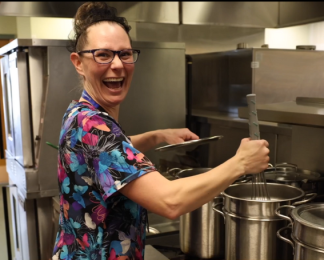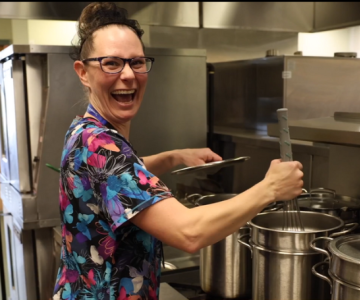Navigating a conversation about an individual’s serious illness can be a difficult and uncomfortable part of the job for many health-care providers. Some may be unsure about what to ask, or how much detail to share with someone about their condition and prognosis.
Yet, having open, honest and compassionate conversations with people during their illness is essential to help individuals and families make care decisions that align with their personal goals, hopes and wishes.
Within Interior Health, providing support for staff and physicians by having Serious Illness Conversation Guide workshops has been a priority for several years. Online education tools and role play opportunities help clinicians feel more comfortable navigating these essential conversations.
“Research in cancer care is clear. Person-centred communication gives less anxiety, less depression and on average a longer lifespan. Imagine this approach applied to both preventing and living with chronic disease. No side effects. Only benefits for all involved,” says Dr. Greg Andreas. “It is time to change. Care should be first about the person, not their pathology. Planning can then evolve for their best possible days, months, decades… I have yet to have anyone talk about how they would like to spend their last 12 months of life lost in our hospital system.”
Practice lead Carla Williams agrees and says she believe when clinicians use the Serious Illness Conversation Guide and talk about a person’s wishes early on, it improves the individual’s experience of death and dying.
She recalls how the guide helped her in a conversation with a woman who was palliative in hospital.
“Staff were uncomfortable because they said she did not believe she was dying but they felt that hospice would be best for the patient,” says Carla. “I introduced myself as a social worker, (and) let her know that I was here to ask for permission to have what we call a Serious Illness Conversation to better understand her wishes relating to her health.
“I asked ‘what is your understanding of where you are today?’ She very clearly stated, ‘I am dying and have a month to live.’ We continued through the discussion asking about her goals, fears, strengths, abilities, trade-offs and family. At the end of the discussion, she was clear that she wanted to go to hospice and have her family with her. She already knew she was dying and knew where she wanted to palliate and felt comfortable knowing she would not undergo more testing and have a lengthy hospital admission.”
Carla says the Serious Illness Conversation Guide is especially helpful because the language is so clear.
“In my experience with using the guide, I have never had a patient not understand the questions as they are written. There has never been a time when a patient expressed confusion over the question when using the guide as it recommends. I believe that the patient-tested language is powerful and that the questions truly illicit the true feelings and desires of the patient as they move through their own mortality,” says Carla.
In Interior Health, the work to build capacity for Serious Illness Conversations and develop a community of practice has been led by clinical nurse specialists Vicki Kennedy and Shannon Paul-Jost. Vicki’s work is in palliative and end-of-life care, while Shannon’s focus is gerontology. They were early adopters, having participated in a BC Centre for Palliative Care’s Serious Illness Conversation Guide Train the Trainer workshop in 2018.
Two pilot Serious Illness Conversation Guide workshops were conducted across the Interior Health region, and an evaluation showed positive results that clearly demonstrated the value of the guide. This led to the development of a knowledge translation strategy, and to the building of relationships with post-secondary institutions across the region. Today, faculty from UBC Okanagan, Thompson Rivers University, Selkirk College and College of the Rockies have all expressed interest in workshops for third- and fourth-year nursing students.
Since July 2018, there have been 43 Serious Illness Conversation Guide workshops in Interior Health, with 891 individuals trained to have Serious Illness Conversations.
Learn more:














